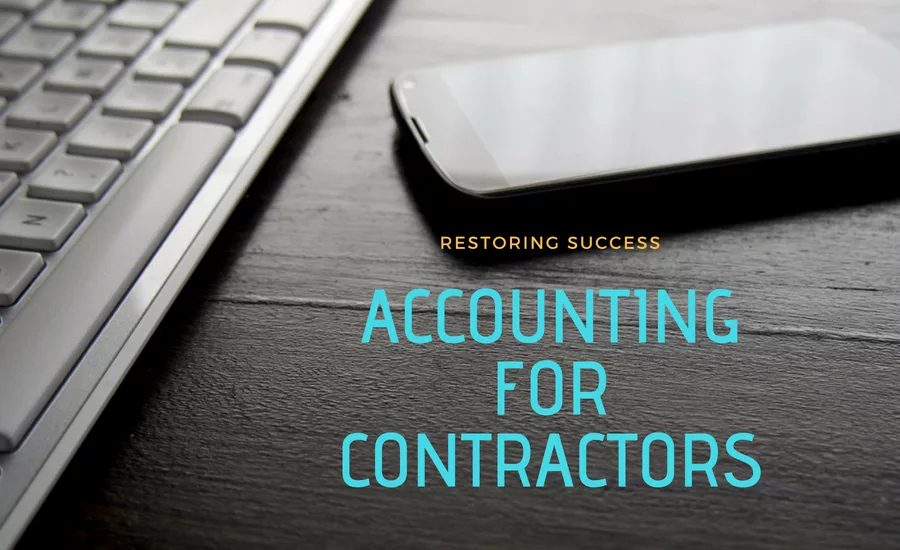Restoring Success: Accounting for Contractors

When I received my degree in accounting from Penn State in 1996, I did not realize I would be using these valuable skills to start and grow a restoration company. Managing and understanding the accounting within your organization is important to the overall health of your company. Accounting practices and information are not just for owners and managers it can also provide useful tools to those running jobs and help you with everything from long-range planning to daily decision making.
Not unlike the restoration industry, accounting has a variety of disciplines that play a role in restoration company operations:
- Tax
- Financial
- Managerial
- Audit
In addition to the need for the most basic functions like paying the bills, filing the taxes, and processing payroll, there are a variety of areas that accounting practices, reporting, and understanding will help within your organization:
- Financial Health: By developing and managing the accounting functions within your organization, you will have a clearer picture of your financial position as an organization, allowing you to better manage your overall health. Key elements to consider:
- Budgeting and Profitability
- Job Level
- Department Level
- Company Level
- Metrics and Goals
- Establish and monitor key metrics and goals that allow you to manage
- As a useful tool for individuals to meet performance objectives and goals (communicate expectations)
- Budgeting and Profitability
- Information: The more the developed your accounting system is within your organization, the more access there may be to timely and useful information for your team to manage the organization.
- Financial Statements: There are a variety of key financial statements that may be produced at various intervals within your organization: Profit and Loss, Balance Sheet, and Statement of Cash Flows. Statements can be useful management and decision-making tools but are also helpful and sometimes necessary for external reporting.
- Access to a variety of accounting information to people in various roles may help them best manage their responsibilities. Examples maybe include job cost reports or actual to budget for overhead type expenses.
As a restorer, accounting may not be your favorite thing or perhaps you may have a passion for number crunching; either way, it is a necessity and extends beyond having a balance in the checking account. The following are a few of my top tips from an Accountant Restorer:
- Learn: There are a variety of ways to learn about accounting including classes and literature. A quick google search will present a variety of information on basic accounting principles. You can also learn from colleagues and business partners.
- Software: Accounting software is a wonderful tool and can make accounting very easy. I encourage you to go beyond the functionality of an accounting software system and understand the relationship to your organization’s financials and between the various accounts. A good start is to learn basic accounting and become familiar with debits and credits. For example:
- Enter a Bill
- Increases Accounts Payable > Increases a Current Liability (Credit to the Liability)
- Increases an Expense (Debit to the Expense)
- Statements: Hits the Balance Sheet as a Liability and Expense on the Profit and Loss
- Pay a Bill
- Decreases Accounts Payable >Decreases a Current Liability
- Decreases Cash
- Statement: Hits the Balance Sheet only
- Enter a Bill
- Chart of Accounts: A solid well-designed chart of accounts is integral to your accounting system. The design of your chart will have a direct impact on your reporting abilities and the corresponding informational tools that may support the operation in the day to day.
- Build a Trusted Accounting Team: You may outsource, have internal staffing, and/or a combination; the accounting team must be highly competent and trustworthy. The accounting functions within your organization impacts many facets of the operations. The function of paying your bills on time consistently may have an impact on your ability to get critical resources on a job at any given moment. By virtue of the functions, those involved in the accounting will have access to confidential and sensitive information, access to resources including cash and credit available, and much that requires a high level of clearance and trust which leads me to the following tip…
- Internal Controls: Regardless of the size of your company, it is imperative that the processes and operations include the best internal controls and the optimal separation of duties that your organization’s structure will allow. The internal control system protects the company’s assets and resources but it also protects the team. If you have concerns about your internal control systems, work with your accountant to assesses and advise.
Accounting is a complex discipline and a vital part of our organizations. Although this is a high-level overview and only scratches the surface, I encourage you give the appropriate attention to this vital part of the successful operation of your organization. Happy Accounting and Happy Restoring!
Looking for a reprint of this article?
From high-res PDFs to custom plaques, order your copy today!







